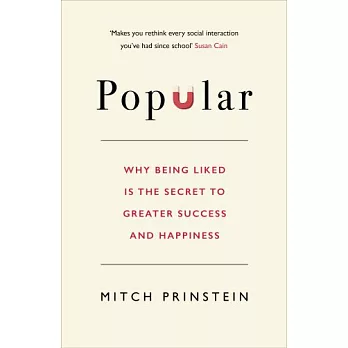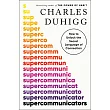為何有人總是到處受歡迎?
你最後一次檢查自己的FB或者IG貼文有幾個讚,是什麼時候?為什麼我們對於被unfriend或著unfollow會感到受傷?今日的政治人物為何會如此在意民調結果或是社群媒體的反應?當面對群眾發表演說的時候,為何腦袋裡總有很多小聲音嗡嗡不止的對著自己叨唸?
我們生活在一個極度注重「人氣」的世代,不僅是在實際生活中,甚至更逐漸轉向在虛擬的平台世界裡。而不僅是網路帶來的影響,個人青少年時期的人際關係與經歷,也深刻地影響一個人成年後的生活,從人際、成就甚至健康。
然而,也不用過度迷信年輕時代的受歡迎程度,因為事實是更為複雜的。本書探討兩種截然不同的人氣來源,其一是來自於地位與優勢,另一個是相較簡單的個人喜好與特質。然而,只有其中一種人氣會帶我們前往更好的未來。
根據20年的深耕研究,人氣學專家、臨床心理學博士Mitch Prinstein與讀者分享關於人氣的科學。分析為何人們如此看重它(即使不認為自己在意)、什麼樣的人氣是值得注重的,以及我們能否自我培養年輕時所欠缺的人氣。作者還為父母親們提供了重要的見解:支持並陪伴孩子培養正確的人氣,將能塑造他們成為積極、正向的大人。在深受網路平台影響的當代,無論大人小孩,本書都能解除你對於「人氣」的迷思。(文/博客來編譯)
When did you last count how many followers you have on Instagram or Twitter? Have you noticed how obsessed politicians are with opinion polls? How many ‘likes’ did that post get you thought was so funny? What’s happening with that friend who keeps cancelling on you last minute? What does that little voice in your head say to you when you present to a room full of people? And are you aware just how much your behaviour today is driven by your experiences of popularity as a teenager?
We live in an era that is completely obsessed with popularity, both in the real and, increasingly, in the virtual world where hard data from our social media channels show us just how popular and visible we really are. Parents and teachers are becoming increasingly concerned about the high anxiety (especially amongst young girls) surrounding young people and their insatiable appetite for acceptance online – all at the expense of school work, real friends and healthy self-esteem.
Popular examines why popularity plays such a key role in our development and, ultimately, how it still influences our happiness and success today. In many ways—some even beyond our conscious awareness—those old dynamics of our youth continue to play out in every business meeting, every social gathering, in our personal relationships, and even how we raise our children. Our popularity even affects our DNA, our health, and our mortality in fascinating ways we never previously realized. More than childhood intelligence, family background, or prior psychological issues, research indicates that it’s how popular we were in our early years that predicts how successful and how happy we grow up to be.
But it’s not always the conventionally popular people who fare the best, for the simple reason that there is more than one type of popularity—and many of us still long for the wrong one. As children, we strive to be likable, which can offer real benefits not only on the playground but throughout our lives. In adolescence, though, a new form of popularity emerges, and we suddenly begin to care about status, power, influence, and notoriety—research indicates that this type of popularity hurts us more than we realize.
Realistically, we can’t ignore our natural human social impulses to be included and well-regarded by others, but we can learn how to manage those impulses in beneficial and gratifying ways. Popular relies on the latest research in psychology and neuroscience to help us make the wisest choices for ourselves and for our children, so we may all pursue more meaningful, satisfying, and rewarding relationships.
Review
“If painful memories of what cafeteria table we ate lunch at can potentially stick with us well into adulthood, what does that say about our culture’s relationship to this thing called ‘popularity’? That’s the question all over the syllabus of Mitch Prinstein’s first book, Popular, a study of how we, all the way down to our DNA, want to be viewed positively by our peers but how we go about it—through being liked, needed, amusing or feared—affects our own health and happiness and that of the society we model from it.”—Kevin Smokler, Slate
“In this fascinating scientific study, Prinstein argues that popularity in the early years is more predictive of adult success and happiness than natural intelligence or family background. The hitch is that there are two kinds of popularity. Those who pursue popularity based on status rather than likeability, argues Prinstein, end up unhappy. Those who are actually likeable—who work well with others, and are kind and generous—enjoy the most success. Prinstein argues that as society becomes increasingly fixated on fame, power and wealth, it is important to understand the dynamics of how they are achieved—and how they aren’t.”—The National Book Review
“Like ‘homecoming’ and ‘curfew’, ‘popular’ is one of those words we tend to associate with high school; and understandably so, since that’s the era of our lives when social status can be a daily crushing concern. But even in the thick of those angsty teenage years, you probably sensed that there was much more to the whole popularity thing than just prom court and class geeks. Like all social dynamics, it's complicated. Just how complicated is terrain tackled in a new book on the subject. Popular digs into the data and research around what designates popularity, and why it’s so definitional—not just in our early lives, but through adulthood.”—Elizabeth Kiefer, Refinery 29
“You might associate being popular at the office with fake smiling, sucking up to bosses, and playing Machiavellian office politics. Those tactics may actually boost one kind of popularity — your status—but will likely hurt the other kind: your likability. . . . There are years' [worth] of research that proves that people who are popular when it comes to social preference are more successful, but you can easily think of examples from your own life and popular culture. ‘I mean, it’s amazing how much we give the benefit of the doubt to likable people, and how much we are willing to do for them and how much we just naturally think good things about them,’ Prinstein said.”—Business Insider
“Prinstein aims to understand popularity; to reconsider our society’s obsession with status; and to show how our desire for social approval can influence our choices. . . . Prinstein concludes by talking about the role of parents in trying to help their children become popular. . . . This highly readable study, which successfully blends science and anecdotes, is strongly recommended for public libraries.”—Library Journal (starred review)
“An intriguing treatise on how popularity works. . . . Prinstein observes that the course of one’s popularity through life is firmly established way back in first grade. However, he notes repeatedly, there are two kinds of popularity: one is an indicator of status and thus highly variable, while the other is likability. . . . an eye-opening look at the ways of the world.”—Kirkus Reviews
“It turns out that there’s more to popularity than status. This book didn’t just capture my attention; it also helped me understand why I wasn’t cool as a kid, why I’m still not today, and why I shouldn’t care.”—Adam Grant, New York Times bestselling author of Originals and Give and Take
“Fascinating, well-researched, and accessible, Popular will make you rethink every social interaction you’ve had since high school, and help you find greater success and happiness. Read this book, and you’ll never think about popularity the same way again.”—Susan Cain, New York Times bestselling author of Quiet
“Is popularity overrated? Maybe not—especially if it’s the right kind of popularity that we seek. In Mitch Prinstein’s fascinating book, you’ll learn all about the benefits and pitfalls of being popular and how to make popularity work for you in business and in life.”—Daniel H. Pink, New York Times bestselling author of To Sell Is Human and Drive
“Popular will show you how to build strong emotional appeal that enables you to stand out from the crowd and wildly succeed. More than ever, this book’s advice is important to parents, future leaders and go-getters everywhere.”—Tim Sanders, New York Times bestselling author of The Likeability Factor and Love Is the Killer App: How To Win Business and Influence Friends
“Popular deserves to be! A delightful and insightful analysis of the longing that makes us human.”—Daniel Gilbert, New York Times bestselling author of Stumbling on Happiness
“Were you popular as a kid? You no doubt have an answer to that, but Mitch Prinstein wants you to have two: Status is one thing, and likability quite another. The origins of both types of popularity are the topic of this singularly fascinating, extraordinarily well-written book. I read it cover to cover and learned as much about the science as I did about myself.”—Angela Duckworth, New York Times bestselling author of Grit: The Power of Passion and Perseverance
“We have all imprinted emotionally on the vicissitudes of our teenage years. Mitch Prinstein, in this compelling, page-turner, tells us why and also how we can shed the skins of our adolescence. Even better he tells us how our children can achieve meaningful popularity. A science-based Dale Carnegie.”—Martin E. P. Seligman, New York Times bestselling author of Authentic Happiness and Learned Optimism
“Who does not want to be more popular? When is that quest not in our best interest? Read Mitch Prinstein’s fascinating new book Popular to discover new views on this vitally important topic. Popular offers a brilliant take on a largely misunderstood subject, shedding light on the type of popularity we crave versus the type that will improve our lives. Based on provocative psychological research, Popular will change how you think about your adolescence, your current relationships today, and ultimately help you become more truly happy in the future.”—Phil Zimbardo, New York Times bestselling author of The Lucifer Effect
“People seek happiness in all aspects of their lives and the quest to be popular is among the most common pursuits. We seek status and gratification from the crowd we run with, the stuff we buy, the street where we live, and the size of our bank account. Mitch Prinstein’s Popular is a perceptive and inspiring examination of how these aims pale in comparison to the power of genuine, lasting social relationships.”—Sonja Lyubomirsky, professor, University of California, Riverside and author of The How of Happiness
“It is hard to imagine a more important book for the popularity-obsessed times in which we are living. Few scientists understand popularity better than Mitch Prinstein, and no one has ever done a better job of explaining its nature, origins, and significance.”—Laurence Steinberg, author of Age of Opportunity and You and Your Adolescent



 天天爆殺
天天爆殺  今日66折
今日66折 
























 博客來
博客來 博客來
博客來 博客來
博客來 博客來
博客來 博客來
博客來